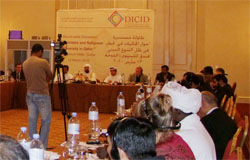
31 Mar ‘Expatriates and religious diversity in Qatar’ Roundtable Discussion Organized in Doha
Community leaders have been urged to do more to educate their compatriots on the customs, tradition and culture of Qatar so that they can better interact with the culture of the host country.
Dr Ibrahim Saleh al-Naimi, the chairman of the Doha International Center for Interfaith Dialogue (DICID), said that community leaders should initiate cultural programmes aiming to “enlighten their community members on the culture of the Qatari community”.
“Why they do not meet on regular basis with all the members of their community whether they were doctors, engineers or workers to make them more aware about the characteristics of the society and request them to adapt to its culture,” Dr al-Naimi told Gulf Times on the sidelines of a round table discussion on expatriates and religious diversity in Qatar.
The roundtable discussion was organised by the DICID in association with the Churches Steering Committee in Qatar.
Dr al-Naimi added that the meeting, which he said, was part of a series of steps by the DICID to maintain the coexistence of the culturally, ethnically and religiously diversified society in Qatar.
“This discussion is part of the cultural mobility and interaction required by the different communities living in this country. We are very keen that leaders of all the religious communities in Qatar including Hindu, Buddhist, and Sikh to attend our meeting so that we can know how to help these communities,” he said.
Asked about the disengagement felt by expatriate communities, Dr Mustapha al-Sirafi, a Muslim scholar, blamed it on expatriates themselves, saying that they did not show enough respect to the host nation’s culture.
“Visit any mall and you will see expatriate men in shorts and scanitly-clad women. I think that was the responsibility of their nations to brief them on the culture of the countries before they send them here,” al-Sirafi told this newspaper.
However, Dr Ashraf Jalal, director of development programmes at the Social Development Center, saw the abuse of sponsorship system as one of the major obstacles facing the engagement of the expatriate communities in the country.
Dr Jalal also suggested the establishment of a council, which he said, can serve as an umbrella organising sports competitions between members of different communities.
He also urged the media for playing a more constructive role to promote the cultural interaction between communities, saying that some media outlets used to present stereotypical image of some expatriate communities in the country.
Highlighting the alienation experienced by many of the expatriates, Jalal said that some 16,000 people visited the psychiatry hospital in 2006, of whom 90% were found to be expatriates.
Dr Ali Mohiyeddin al-Qaradaghi, a Qatar university professor, said that the basic principles of coexistence and information on the major communities in the country should be introduced into curriculum of all the schools.
Al-Qaradaghi also urged expatriates to enroll with Arabic learning programmes, which he said, could help bridge any potential gaps between expatriates and nationals.
A representative of the Nepalese community, a Hindu, hailed the initiative of the DICID, saying that the expatriate Hindus were always ready to participate in the inter-community dialogue initiated by the DICID.
In closing remarks, Dr al-Naimi said the participants agreed on forming work groups to follow up the results of the discussion.



Sorry, the comment form is closed at this time.